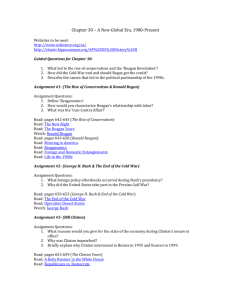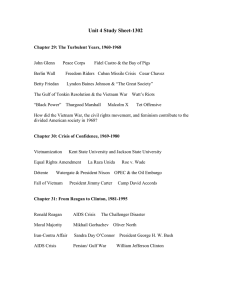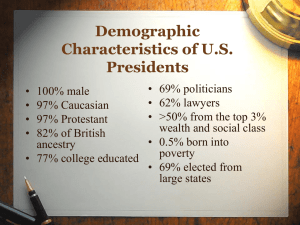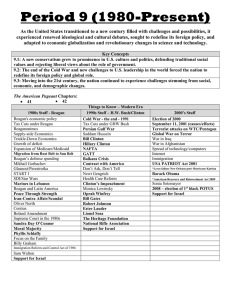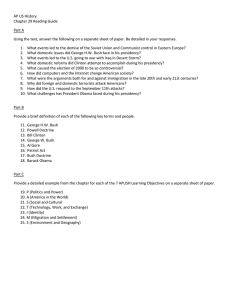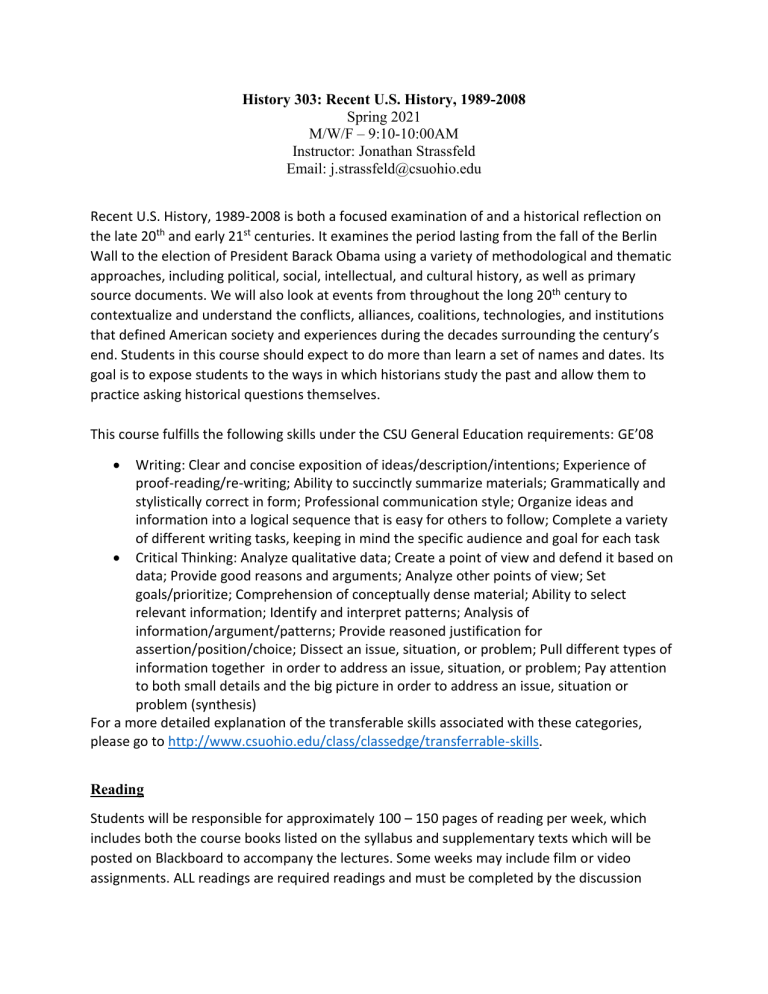
History 303: Recent U.S. History, 1989-2008 Spring 2021 M/W/F – 9:10-10:00AM Instructor: Jonathan Strassfeld Email: j.strassfeld@csuohio.edu Recent U.S. History, 1989-2008 is both a focused examination of and a historical reflection on the late 20th and early 21st centuries. It examines the period lasting from the fall of the Berlin Wall to the election of President Barack Obama using a variety of methodological and thematic approaches, including political, social, intellectual, and cultural history, as well as primary source documents. We will also look at events from throughout the long 20th century to contextualize and understand the conflicts, alliances, coalitions, technologies, and institutions that defined American society and experiences during the decades surrounding the century’s end. Students in this course should expect to do more than learn a set of names and dates. Its goal is to expose students to the ways in which historians study the past and allow them to practice asking historical questions themselves. This course fulfills the following skills under the CSU General Education requirements: GE’08 • Writing: Clear and concise exposition of ideas/description/intentions; Experience of proof-reading/re-writing; Ability to succinctly summarize materials; Grammatically and stylistically correct in form; Professional communication style; Organize ideas and information into a logical sequence that is easy for others to follow; Complete a variety of different writing tasks, keeping in mind the specific audience and goal for each task • Critical Thinking: Analyze qualitative data; Create a point of view and defend it based on data; Provide good reasons and arguments; Analyze other points of view; Set goals/prioritize; Comprehension of conceptually dense material; Ability to select relevant information; Identify and interpret patterns; Analysis of information/argument/patterns; Provide reasoned justification for assertion/position/choice; Dissect an issue, situation, or problem; Pull different types of information together in order to address an issue, situation, or problem; Pay attention to both small details and the big picture in order to address an issue, situation or problem (synthesis) For a more detailed explanation of the transferable skills associated with these categories, please go to http://www.csuohio.edu/class/classedge/transferrable-skills. Reading Students will be responsible for approximately 100 – 150 pages of reading per week, which includes both the course books listed on the syllabus and supplementary texts which will be posted on Blackboard to accompany the lectures. Some weeks may include film or video assignments. ALL readings are required readings and must be completed by the discussion section on Friday. For your convenience, I will maintain a central list with links to the supplemental texts. Students should obtain personal copies of the following books: Dexter Filkins, The Forever War Michael Nelson, Clinton’s Elections: 1992, 1996, and the Birth of a New Era of Governance James T. Patterson, Restless Giant: The United States from Watergate to Bush v. Gore Richard Posner, Not a Suicide Pact: The Constitution in a Time of War [AVAILABLE ELECTRONICALLY VIA THE CSU LIBRARY] Julian Zelizer, The Presidency of George W. Bush: A First Historical Assessment Course Requirements There are five components to your course grade: (1) Weekly response questions, (2) class participation, (3) two analytical papers, (4) a midterm exam, and (5) final exam. All readings must be completed by discussion section, held each Friday, on the week in which they are assigned. Both attendance and participation in discussion section is mandatory. Unexcused absences will be counted against a student's grade. In addition, students must submit a question based on the week's reading via email by 2:00PM Thursday for at least 8 of the course’s 13 discussion sessions. Students should be prepared for their questions to be discussed. A good question will not have a simple factual or yes/no answer. Rather, it should invite discussion of themes or questions raised by the readings on which different perspectives and opinions might be offered. Students will be responsible for writing two analytical papers, 5-8 pages in length, on topics I will assign. Refer to the reading schedule for due dates. Students will also take an in-class Midterm Examination on February 26, and a comprehensive Final Examination at the end of the course. Final grades will be determined by the rubric below: Class Participation and Weekly Questions --- 25% Analytical Papers --- 15% each Midterm Examination --- 15% Final Examination --- 30% Academic Honesty I will enforce a zero -tolerance policy on cheating and plagiarism. Students found giving or receiving unauthorized aid on an exam, or who commit plagiarism on writing assignments will fail the course - no questions asked. Ignorance of the rules is not an excuse. If you are unsure what constitutes plagiarism or what requires a citation, please contact me so we clear up any confusion. You may also consult the Student Handbook and the following website for policies on plagiarism and academic honesty: http://www.csuohio.edu/writingcenter/plagiarism Educational Access Educational access is the provision of classroom accommodations, auxiliary aids and services to ensure equal educational opportunities for all students regardless of their disability. Any student who feels he or she may need an accommodation based on the impact of a disability should contact the Office of Disability Services at (216) 687-2015. The Office is located in MC 147. Accommodations need to be requested in advance and will not be granted retroactively. *I reserve the right to make changes to this syllabus at any point during this semester* Topics and Assignments Week 1: 20 January – Syllabus and Course Requirements 22 January – Introductions and Memories Week 2: 25 January — The New Deal Order (Lecture) Documents: Thomas Edsall, “The Changing Shape of Power: A Realignment of Public Policy” The Living New Deal – Projects in Cleveland 27 January — Documents and Questions 29 January — The Reagan Era (Discussion) Assignment: Patterson, Restless Giant, 108-217 Ronald Reagan, 8/3/1980 Neshoba County Fair Speech (video) Ronald Reagan, First Inaugural Address (video) Week 3: 1 February — Origins of the Cold War (Lecture) Documents: George Marshall, Marshall Plan Speech (video) Winston Churchill, Iron Curtain Speech (selections) Report: Soviet Intentions and Capabilities (selections) George Kennan, “Sources of Soviet Conduct” 3 February — Documents and Questions 5 February — End of the Cold War (Discussion) Assignment: Francis Fukayama, “The end of History?” CIA Intelligence Assessment: Gorbachev’s Economic Agenda National Security Directive 23 Ronald Reagan, Letter to Brezhnev Conversation between M. S. Gorbachev and George Shultz Ronald Reagan, “Evil Empire” Speech Ronald Reagan, Letter to Gorbachev Ronald Reagan, Brandenberg Gate Speech Week 4: 8 February — Vietnam War (Lecture) Documents: Pentagon Papers (selections) 10 February — Documents and Questions 12 February — Gulf War (Discussion) Assignment: Patterson, Restless Giant, 218-253 Christian Appy, American Reckoning, 221-304 Kai Bird, “…Vietnam Syndrome Continues” Frank Snepp, “The Vietnam Syndrome” Week 5: 15 February — Presidents Day Holiday – No Class 17 February — Neoliberalism (Lecture) Documents: Charles Peters, “A Neoliberal's Manifesto” Lewis Powell Memo Ludwig von Mises, Bureaucracy (selection) Milton Friedman, “The Social Responsibility of Business to Increase its Profits” 19 February — 1992 Election (Discussion) Assignment: Nelson, Clinton’s Elections, 70-162 1988 “Willie Horton” Ad (video) Nathan Robinson, “The Death of Ricky Ray Rector” Week 6: 22 February — Church and State (Lecture) Documents: Randall Balmer, True Origins of the Religious Right (video) 24 February — Documents and Questions: FIRST ANALYTICAL PAPER DUE 26 February — The Culture War (Discussion) Assignment: Patterson, Restless Giants, 254-317 Patrick Buchanan, Culture War Speech (video) John Killacky - Inside the Culture Wars Maelstrom of the 1990s Jennifer Hochschild, “Affirmative Action as Culture War” Week 7: 1 March — Midterm Review Meeting 3 March — MIDTERM EXAM 5 March — Domestic Terrorism (Discussion) Assignment: Kathleen Belew, “The History of White Power” Todd Kerstetter, “’That's Just the American Way’: The Branch Davidian Tragedy and Western Religious History” Ed Vulliamay “Oklahoma: the day homegrown terror hit America” Alston Chase, “Harvard and the Making of the Unabomber” Week 8: 8 March — Politics and Policy of the Clinton Era (Lecture) Documents: Newt Gingrich, “Contract with America” The Personal Responsibility and Work Opportunity Reconciliation Act of 1996 David Graeber, “On the Phenomenology of Giant Puppets” 10 March — Reading Day – No Class 12 March — American Society in the 1990s (Discussion) Assignment: Patterson, Restless Giants, 318-386 Nelson, Clinton’s Elections, 163-228 Patricia Fernandez-Kelly and Doug Massey, “Borders for Whom?” Peter Schwartz and Peter Leydon, “The Long Boom: A History of the Future” Kevin Kruse and Julian Zelizer – “How policy decisions spawned today’s hyperpolarized media” Rush Limbaugh 60-minutes Interview (video) Week 9: 15 March — Women and the Workplace (Lecture) Documents: Nancy Frasier, “Sex, Lies, and the Public Sphere” Barbara Amiel, “Feminism: What NOW?” Jane Mansbridge and Katherine Tate, “Race Trumps Gender: The Thomas Nomination and the Black Community” Margaret Carlson, “Smearing Anita Hill: A Writer Confesses” 17 March — Documents and Questions 19 March — The Clinton Impeachment (Discussion) Assignment: The Clinton Impeachment, a Basic Chronology Richard Lacayo and Adam Cohen, “Inside Starr and His Operation” Clinton Lewinsky Scandal Breaks on CNN (video) Bill Clinton – Response to the Lewinsky Allegations “Day 2 of Senators’ Questions and Responses from Both Sides” JD Lasica, Internet Journalism and the Clinton-Lewinsky Investigation Barry Burden and Anthony Mughan, “Public Opinion and Hilary Rodham Clinton” Monica Lewinsky, The Price of Shame (video) Week 10: 22 March — 2000 Election (Lecture) Documents: Presidential Debate Highlights (video) Saturday Night Live, Gore and Bush’s Moderate Candidate (video) Election night footage (video) Brooks Brothers Riot (video) Al Gore Concession Speech (video) Saturday Night Live, Bush and Gore's Meeting Cold Open (video) 24 March — Documents and Questions 25 March — Domestic Policy of the Bush Era (Discussion) Assignment: Zelizer, The Presidency of George W. Bush, 39-58; 169-251 When the Levees Broke, Acts 1 and Act 2 (film) Week 11: 29 March — 9/11 Attacks (Lecture) Documents: Osama bin Laden, 1998 Fatwah George Bush, Remarks at Ground Zero (video) George Bush, 9/11 Oval Office Address (video) Steve Hendrix, “F-16 pilot was ready to give her life on Sept. 11” House debate on Authorization for the Use of Military Force (selections) Russ Feingold, “Statement on War Powers” 31 March — Documents and Questions 2 April — The Security State (Discussion) Assignment: Posner, Not a Suicide Pact, 1-76; 127-158 David Cole, “The Poverty of Posner’s Pragmatism: Balancing Away Liberty After 9/11” Senate Torture Report - Findings Week 12: 5 April — War in Afghanistan (Lecture) Documents: Anthony Dimaggio, “Rhetoric of Fear and Hope in Afghanistan” Lyle Jeremy Rubin, “Base Culture” 7 April — Documents and Questions 9 April — Iraq War I (Discussion) Assignments: Filkins, Forever War, 1-94 Zelizer, The Presidency of George W. Bush, 88-113 George Bush, Cincinnati Speech on the Iraqi Threat (video) Nikolaev and Porpora, “Talking War: How Elite U.S. Newspaper Editorials and Opinion Pieces Debated the Attack on Iraq” Interview of Thomas Friedman (video) “Rice Responds to Times Report on Tubes and Intelligence” Week 13: 12 April – American Empire (Lecture) Documents: Greg Grandin, Empire’s Workshop (selections) 14 April — Documents and Questions 16 April — Iraq War II (Discussion) Assignment: Filkins, Forever War, 214-334 Donald Rumsfeld Q&A (video) Seymour Hersh, “Torture at Abu Ghraib” "There Was No Plan": An Interview with Rajiv Chandrasekaran William Kristol, “We Were Right to Fight in Iraq” Sinan Antoon, “Fifteen Years Ago America Destroyed my Country” Week 14: 19 April — Financialization (Lecture) Documents: Karl Marx, “The German Ideology” (selection) Michael Hudson - Financial Capitalism v. Industrial Capitalism 21 April — Documents and Questions: SECOND ANALYTICAL PAPER DUE 23 April — 2008 Financial Crisis (Discussion) Assignment: Inside Job (film) George Bush, Speech on the Economic Crisis Matt Taibbi, “The Great American Bubble Machine” David Graeber, “Occupy Wall Street Rediscovers the Radical Imagination” Week 15: 26 April — Race in America (Lecture) 28 April — Documents and Questions 30 April — 2008 Election (Discussion) Assignment: TBD
